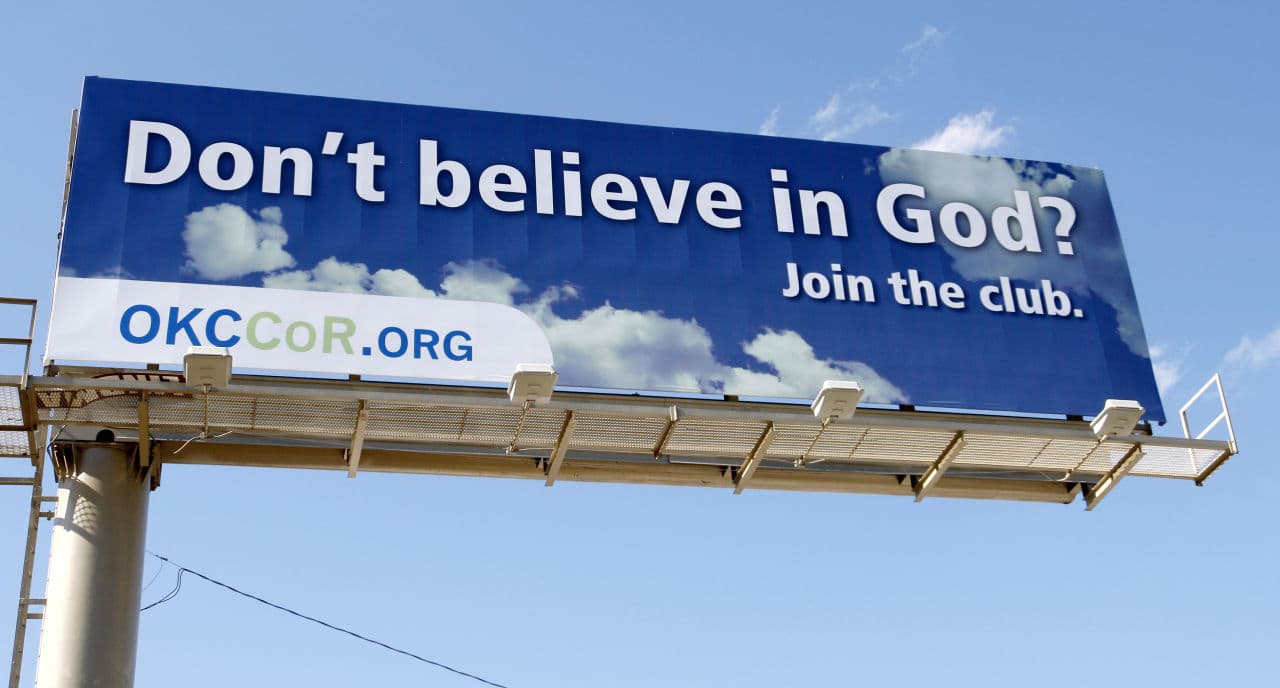Advertisement
For The Love Of God? The State Of Religious Faith In America Today

Last winter, I caught a talk by noted Harvard psychologist Steven Pinker to a group of local academics and clergy who regularly get together to discuss science and religion. Pinker believes our increasingly nonviolent world owes to the spread of reason, thanks to better education and the like, rather than to any benevolent effects of religion. During the question period, one attendee asked at length about the role of nuns.
Or so we thought. It wasn’t until the end of his soliloquy that it became clear that he was referring to “nones,” as in, those with no religion. A collective ohhhhh rippled through the room, while Pinker joked that he needed to rethink his answer, as he’d been forming mental images of Sally Field ("The Flying Nun") and the sister who sang "Dominique."
Amusing at the time, the question seems prophetic after the recent Pew Research Center report about the potential cratering of Christianity in the United States. The role and mushrooming numbers of nones, it turns out, are substantial. This is nothing for Christian Americans to fear. Not only is it perfectly understandable, it hands Christians and the unaffiliated, as Pew calls them, a priceless opportunity to learn from each other, if only we don’t blow it.
According to Pew, which surveyed more than 35,000 people, the sun won’t set on U.S. Christianity anytime soon; we still have more Christians than any other nation. But their share of the population has plunged since 2007, from 78 percent to 71 last year. The nones — "describing themselves as atheist, agnostic or ‘nothing in particular’" — surged from 16 to 23 percent, a growth of about 19 million adherents, er, non-adherents. That makes them runner-up, behind evangelical Protestants, as the second largest religious group. (Non-Christian religious believers also multiplied, but their growth was less eye-popping, from roughly 5 percent of the populace in 2007 to 6 percent last year.)
...we still have more Christians than any other nation. But their share of the population has plunged since 2007, from 78 percent to 71 last year.
The rise of the nones has been predominantly a story among the young, thought not exclusively. This means that Christians banking on maturing to bring more young Americans to Jesus in the future perhaps shouldn’t hold their breath. Almost a third of the unaffiliated are atheists and agnostics, while another 39 percent shun any faith description and say religion is irrelevant to them. That leaves 30 percent who decline affiliation but still call religion important in their lives; these apparently are the spiritual-but-not-religious school. Meanwhile, the collapse among Christians has been most pronounced in my own Catholic tradition and in mainline Protestantism. The decline of religious affiliation is especially stark when you consider that only 7 percent of Americans were nones in the early 1970s.

Traditionalist believers will bewail their country careening toward the proverbial hell in a handbasket (or just plain hell). The conservative Christian intellectual Dinesh D’Souza once called atheism “the opiate of the morally corrupt,” simultaneously proving that religion doesn’t guarantee goodness (D’Souza went on to plead guilty to an illegal campaign donation) and demonstrating why many choose to sleep in Sundays. Christians can glean valuable moral reflection from the nones’ aversion to religious intolerance, opposition to gay rights, and sins like the Catholic pedophile scandal.
And yet… enough Christians disapprove of the foregoing views and behavior that Greg Epstein, Harvard’s humanist chaplain, once suggested that nones could learn from religious people, particularly “the way that they take care of one another.” There’s something else religion, properly understood, teaches, as James Carroll, the progressive Catholic author I admire, reminds us: the capacity to correct its own flaws.
Christians can glean valuable moral reflection from the nones’ aversion to religious intolerance, opposition to gay rights, and sins like the Catholic pedophile scandal.
Carroll appreciates secularism, but he also knocks fundamentalist secularists for missing “how every religion includes — within its dogma and tradition — the principles of its own self-criticism. The universal prohibition of idolatry, for example, means that anyone who kills wantonly, no matter the justification, is claiming an absolute moral power that does not belong to human beings. The worship of God carries with it the prohibition against the worship of self as God. Religion so emphatically insists on this precisely because something in the human heart wants to be God, and when that something prevails, all hell breaks loose.”
Carroll was writing specifically about Sunni extremists rampaging in Iraq. That would seem to exemplify religiously inspired violence; actually, he wrote, it “is a reminder that the scourge of violent Islam was itself sparked by that most secular of events, World War I, which destroyed the Ottoman caliphate, and first set loose the modern jihadists who claim their acts of torture originate with God. No, they originate with humans, which is why humility is due of all of us.”
The world includes many people decidedly un-humble in their certitude, from Christians like D’Souza to atheists like Richard Dawkins, whose efforts to dismiss any benefits from religion flunk the giggle test. If religion could instruct such men, and all of us, in the value of humility, what a better world it would be.
